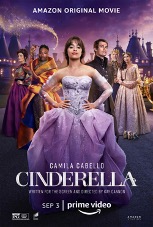 Once upon a time, there was a young woman named Cinderella (Camila Cabello). In the 2021 film, she loves to design dresses and wants to make a business out of it. When the prince (Nicholas Galitzine) announces a ball, her stepmother Vivian (Idina Menzel), wanting to protect her from the patriarchal world outside, destroys Cinderella’s dress to keep her from potentially marrying a man she’d just met. The prince, however, is in love with his best friend (Jenet Le Lacheur) but can’t really admit it – not even to himself. Also, he’s not qualified to rule the kingdom. The patriarchy, however, wants him to become king and will never agree to his smart sister (Tallulah Greive) becoming queen.
Once upon a time, there was a young woman named Cinderella (Camila Cabello). In the 2021 film, she loves to design dresses and wants to make a business out of it. When the prince (Nicholas Galitzine) announces a ball, her stepmother Vivian (Idina Menzel), wanting to protect her from the patriarchal world outside, destroys Cinderella’s dress to keep her from potentially marrying a man she’d just met. The prince, however, is in love with his best friend (Jenet Le Lacheur) but can’t really admit it – not even to himself. Also, he’s not qualified to rule the kingdom. The patriarchy, however, wants him to become king and will never agree to his smart sister (Tallulah Greive) becoming queen.
When Cinderella’s fairy god person (Billy Porter) arrives, they not only turn one of her designs into reality, but they also throw a party at Cinderella’s place. When the prince and his best friend arrive, the presence of the fairy god person gives them the strength to admit their feelings for each other. The prince’s sister becomes heir to the throne, and Cinderella finds a queen with whom to travel around the world and sell her designs. And they all live happily ever after.
Only that’s not what happens.
After watching the trailer promising a queer fairy god person and Latina singer Camilla Cabello playing the main role, I was looking forward to watching director Kay Cannon’s adaptation of Cinderella.
https://www.youtube.com/watch?v=T1NeHRuPpoM
With all the promise of this trailer, I thought that 2021 would finally be the year to create a movie that’s more than just a white, heteronormative tale of girl-meets-boy and gets married. I honestly thought that, at the very least, Cinderella would be depicted as some sort of high-powered professional who could serve as a role model.
Once again, I was disappointed. And kind of angry. The filmmakers were really on to something. I could see how they tried to deal with problematic stereotypes. Yet, they didn’t take it far enough and laughed off hints at problematic issues. Were they afraid of the many critics who had complained about “the queer feministic agenda being foisted on them”? That’s no excuse, however, for making a bad movie. If the tone is a progressive, critical one, then you got to do it right.
There is a lot of queerness in the movie – the most obvious being the Fabulous Fairy Godmother, which I enjoyed a lot. Or the prince’s best friend. There are moments when there’s chemistry or at least familiarity between them, more than between the prince and Cinderella. I understand that it’s the story of Cinderella and the prince, but wasn’t this supposed to be a new take on the fairy tale? Also, instead of showing the skills and abilities of the prince’s sister, she’s portrayed as a bratty child, a mean caricature of Fridays For Future teenagers. The prince – who claims not to have time for his kingdom because he prefers to get drunk and hunt foxes – still comes across as the better choice because at least he’s not the annoying pushy teen girl his sister appears to be.
Additionally, the main character Ella isn’t even likeable. She’s blunt and thinks she has a royal right to success. To me, she’s not brave and modern but arrogant and reckless. At one point, when the prince falls for her, she climbs on the statue of his grandfather in order to get a better view. The king shouts at her to climb down, but instead she arrogantly chirps: “Everybody’s staring at me, just as I’d hoped. I’m sorry, your Highness! It’s just really hard to see in the back!”
In addition, while the outfits of the other women seem to reflect their characters’ personalities, Ella’s dresses are boring, uninspired, and lifeless. And we’re supposed to believe this woman is a talented dressmaker?
There’s a whole lot more to complain about – like the movie fat-shaming big people who apparently think about food all the time. There are things the movie did right like casting a woman of color. I must admit that I think Cinderella missed its chance here – even if the makers’ intentions were good. Apparently, they wanted praise for your typical everyday wokeness while still including unhealthy stereotypes for laughs – to add just the right amount of queerness to be celebrated, yet pass as straight.
10,218 Total Views, 11 Views Today






